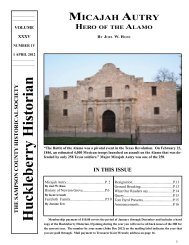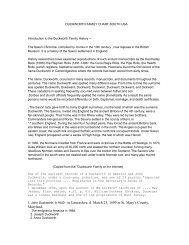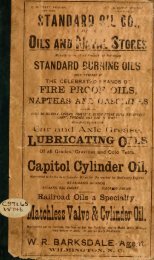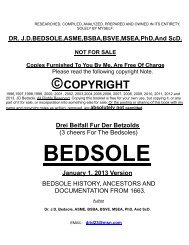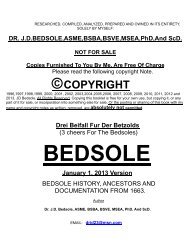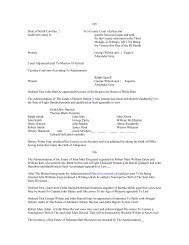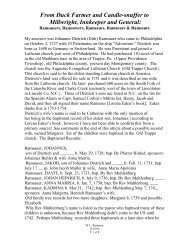11/25/07 VERSION: BEDSOLE HISTORY FROM 1673 ... - NCGenWeb
11/25/07 VERSION: BEDSOLE HISTORY FROM 1673 ... - NCGenWeb
11/25/07 VERSION: BEDSOLE HISTORY FROM 1673 ... - NCGenWeb
Create successful ePaper yourself
Turn your PDF publications into a flip-book with our unique Google optimized e-Paper software.
The location of their log houses was important and they were located as close as<br />
possible to a source of good drinking water, preferably a spring. Having to dig a forty<br />
or fifty foot-deep well, was a luxury which could be ill-afforded, when they didn’t even<br />
have a house to live in. They worked together to get the jobs done, handling the big,<br />
heavy logs, working on first one house, then the other, cutting the trees down,<br />
trimming them and dragging the resulting logs to the house site. The debarking and<br />
splitting of the logs and putting up the framework and then making hundreds of<br />
thousands of handmade wooden shingles for the roofs, took several weeks. Dirt<br />
floors sufficed at the time. Houses were crude and consisted of only one room.<br />
Wooden floors and porches were luxuries which would have to wait.<br />
.................................PAGE 8.......................................................................................<br />
The clearing of land and construction of houses took several of the summer months<br />
and the settlers were hard-pressed to get the houses done and a supply of firewood<br />
cut for the 4 to 5 months of winter which lay just ahead of them, beginning in<br />
November. They also needed lots of animal hides, dried and cured, prepared for the<br />
winter, by the women and children. Teamwork among all concerned was an absolute<br />
necessity and meant the difference between life and death most of the time. Syrup<br />
and cornbread for breakfast, turnips or grease/gravy and cornbread for lunch/dinner<br />
and the same for supper, were their primary foods.<br />
Meat was a rarity because of the small supply of gunpowder and shot, which were<br />
expensive and needed for protection from Indians which was a priority.That forced<br />
them to use traps for wild animals and meat. Meat was preserved by smoking it for a<br />
week or more, but that required a small smokehouse and lots of wood, then<br />
someone to attend to the smoking process. Vegetables were mostly non-existent<br />
most of that first summer season. At that time, they had no means of communicating<br />
over long distances with each other except by runner and in cases of Indian attacks,<br />
which occurred too frequently, the runner himself would become the prime target of<br />
the Indians.<br />
Before long however, those who could afford one, had put a large iron bell up on a<br />
30 foot pole at the edge of their yards which were rung by pulling a rope. About noon<br />
every day, the ringing of these bells meant come and eat, to the field workers. With<br />
houses so far apart, it was clear whose bell was ringing. If the bell rang at any other<br />
time, especially at night, it meant an emergency had occurred at that particular<br />
house, and anyone hearing it ran to help. Five peals of the bell meant come and eat.<br />
Ten meant emergency here, need help. Twenty, meant a life or death situation had<br />
developed at that house and when an emergency occurred some rode their mules at<br />
a dead run, whether in daytime, or the dead of night. But when the bell rang at night,<br />
it filled everyone with dread, for it was a sure sign of very serious trouble at that<br />
house. The house was on fire, someone was dying, they were being attacked by<br />
Indians, or other disasters were occurring. The settlers were collectively hard<br />
working people who supported and cared for one another. Each depended on the<br />
others for help if anything happened because the situation could easily reverse



